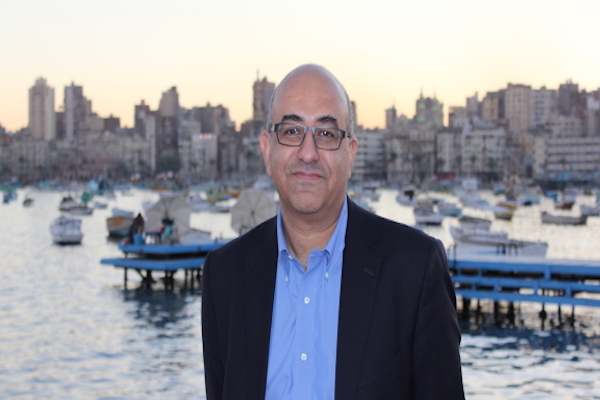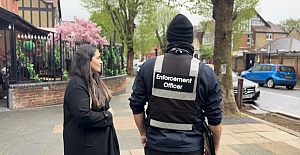On the other hand, they have been assessing the post-Arab uprisings period in Egypt, Tunisia and Libya. In this context, Turkey and its politics have influenced or at least have attempted to influence the changing atmosphere of the Middle East, in both Egypt and Syria. As Centre for Policy and Research on Turkey (Research Turkey), we conducted an interview with Associate Professor Samer Shehata to understand the underpinning reasons behind the emergence of the ISIS. In addition, he demonstrates how the Muslim Brotherhood has evolved throughout the time by highlighting its current position. In drawing this unique picture of the Middle East, Associate Professor Shehata highlights the position of Turkey, too.
Samer S. Shehata is Associate Professor of Middle Eastern Politics in the Department of International and Area Studies at the University of Oklahoma. A specialist in Egyptian politics and the Muslim Brotherhood, he has previously taught at Georgetown University, New York University, Columbia University, and the American University in Cairo. He received his PhD from the Politics Department at Princeton University in 2000.

Synopsis of the Interview
“Turkey was one of the first countries that condemned the atrocities in Syria and the regime of Bashar al-Assad and called for more international steps of course to do so.”
“Regarding Kobane, Turkey was reluctant to provide any help to Kurdish fighters for their struggle against the Islamic State of Syria and Iraq (ISIS). The rationale of this is that for Turkey, the Kurdish issue was more important than the ISIS or rising Islamic extremism.”
“Due to Syrian civil war, many countries (such as Lebanon and Jordan) have taken in many refugees. In contrast to Turkey, Lebanon and Jordan have been able to accept fewer refuges. The problem lies on the fact that the refugee population is causing a huge burden on the local economies as their economies are still developing.”
“There is evidence that the ISIS has been receiving financial support from some of the Gulf countries at the individual level, but there is still no indication of it at the governmental level.”
“There are two underpinning reasons behind the emergence of the ISIS. First, the US invasion of Iraq and its unintended consequences: politics adopting a more sectarian approach, the surge and hegemony of Shia politicians and groups in Iraq and the marginalization of the Sunni population. Second, the American indecisive approach regarding the dynamics in Syria: the ISIS speeded further as a response to the brutal industrial killing machine of Bashar al-Assad. More violence has led to more extremism.”
“During the regime of Nouri al-Maliki, Sunni minority were marginalized, imprisoned and were terrorized by the Shia community.”
“It is argued that the ISIS threatens countries like Saudi Arabia ideologically more than Turkey, Egypt or Tunisia, because there are far fewer adherents of that kind of extremist ideology in Egypt or Turkey than there are in Saudi Arabia, where this kind of ideology might have already some origin in the population.”
“The Brotherhood used to live under repressive governments that in return damaged further to the ideology. However, over the last two year, the Muslim Brotherhood has been experiencing suppression from an autocratic regime, too.”
“The Sisi government was a lot criticized. However, there were good sides of the Sisi government, too. People feel more secure now; policing has increased and it seems that crime rate are falling down and people are feeling less vulnerable.”
“Currently, Turkish-Egyptian relations have reached to their lowest point in the whole history. Mr. Erdoğan’s condemning the Sisi government as a coup, his personal critic of the Sisi government in international media and his open support for the Muslim Brotherhood has contributed to the deterioration of the relations.”
Full Text of the Interview

I want to start with an issue that is at an intersection of many issues in Middle Eastern politics, which is the siege of Kobane, in Syria, where you have the questions of Turkish-Kurdish relations, the threat of Islamic State of Iraq and Syria (ISIS), and the interplay of the Syrian civil war. How do you evaluate the nearly year –long fighting and the siege of Kobane– what has happened in the past year and what do you think the ultimate goal of ISIS is by attacking and trying to take control of this city?
As you have pointed out, there are multiple dimensions to this, of course. For the Turkish regime, this goes well beyond simply ISIS or the Islamic extremism and so on. This has to do with Kurdish issues which are particularly sensitive and I think that explains the initial reluctance and continuing reluctance to fully come out on the side against ISIS and to allow Peshmerga and others to come into Kobane through Turkey and to fight ISIS forces there. I think that there has been a great deal of attention; it has been in the media spotlight, which might be because of the border situation and the ease of reporting. If you follow what’s going on in Syria or in parts of Iraq, there are many other horrific episodes and areas of fighting and so on.
“For Turkey, Kurdish issue outweighed more than the ISIS’s Islamic extremism. That’s why Turkey was not willing to allow Peshmerga and others to come into Kobane through Turkey and fight ISIS there”
On the border situation as well, in the midst of the Syrian civil war what are the reasons why Turkey has accepted such a significant number of refugees within its borders? Is this related in any way to Turkey’s continuing reluctance to enter into any kind of coalition against ISIS without the additional measures to put them against the Assad regime –ensuring the Assad regime would also be viewed as an adversary as much as ISIS?
I think you have correctly hit on one of the issues going on here. Turkey and Mr. Erdoğan were one of the first to condemn the atrocities in Syria and the regime of Bashar al-Assad and have called for more international steps of course to do so. And so as a result of that and also as a result possibly of ideology or a belief that as conservative democratic or soft Islamist or Islamist ideology behind Mr. Erdoğan and the Adalet ve Kalkınma Partisi (Justice and Development Party) (AKP) and so on, it is a kind of duty to provide support and refuge for these refugees that are the victims of course of a brutal regime which he has called for its end in a way. So, I think that explains it largely. If you want to think in a hard way about this, what would be the alternatives? Are the alternatives to limit refugees coming across the border? That’s a humanitarian disaster. Certainly, other countries have taken in significant numbers of refugees (not as much as Turkey) but Jordan as well as Lebanon are also not economically thriving so the refugee population puts a burden on the domestic economies. In the case of Lebanon, it also causes tumult and difficulty in terms of Lebanese internal politics because of Hezbollah’s role supporting the regime as well as the largely quiet, but nevertheless support of the Sunni population against Assad, so all of the countries in the region are dealing with this –Turkey maybe the most– but, I think that largely explains Turkey’s willingness to accept the numbers of refugees that they have.
“Not only Turkey, many other countries such as Jordan and Lebanon have accepted refugees. However, as their economies are not so robust, the refugee population becomes a financial burden on them”
One concern of many Turkish people is what is going to happen to the large population of Syrian refugees within Turkey. There is a lot of talk about this so-called ‘lost generation’ of Syrian youth who have been displaced as a result of the conflict and are now living in Turkey but without the same sort of integration into an education system that would equip them to live in Turkey as citizens who have had the benefits of a normal education. Is the conflict at its end and could we see a return of people from Turkey to Syria? What are the prospects for an end to the conflict and the number of people it has displaced?
I think the prospects for a hopeful outcome are very small, obviously. I do not think we’re going to see large numbers of refugees, maybe some, in some cases, returning to Syria. The Assad regime still seems to be holding on, there is obviously a brutal, multi-dimensional, multi-party fighting that is taking place. The supporters of the Assad regime –Iran and Russia– do not seem to be lessening their support. Even if somehow the regime were to be defeated, which I do not think is likely in the next half year, possibly ever, that by itself would not necessarily produce return flow of refugees because you would be dealing with the aftermath of a civil war which, in many cases, is lack of rule of law, security issues, and other fighting between factions. Unfortunately, I do not see the movement of these refugees back into Syria in the short-term. At the same time, they could produce problems for Turkey, but I do not necessarily think it’s those kinds of problems, I think there are security and economic problems but I do not think there is any talk of trying to integrate or naturalize these refugees into the Turkish population. I think that would be a high order for any country, and certainly Turkey.
“Even if the regime in Syria is somehow defeated, there will be further problems of the post-war conditions: lack of rule of law, security issues, and fights between different sanctions”
You mentioned other actors in the Syrian conflict –I want to ask your opinion on a related subject. We always talk about the role of Turkey or western actors in fighting ISIS. Do you think there are other actors that are going to be involved or are involved in the fight against ISIS? How do other states like Russia, Iran, and Israel have a stake in this conflict?
There are so many countries that are involved in the Syria situation in one way or another and some have been active militarily for example, Israel. Certainly, the Gulf countries as well… Their willingness to overtly take on ISIS varies, and so, Kuwait, Saudi Arabia, Qatar, we know there have been financial flows from some of the Gulf countries to ISIS from individuals, not evidence of governments sending those funds. Israel clearly has an interest in what takes place on its border but from what I have read, I have not seen any kind of direct Israeli action against ISIS. That, of course, would complicate the Arab effort to fight ISIS. So, yes, ISIS is one point of similarity where countries that have different interests, Iran and the United States, Iran and Saudi Arabia, Russia have in common. That, unfortunately, has not led to as much as one would have hoped in terms of dealing with not only ISIS, but the context that led to the creation of ISIS, which unfortunately, I do not see being dealt with sufficiently, either on the Iraqi side of the border, or of course with regard to the Syrian situation.
“There have been financial flows from some of the Gulf countries to ISIS at the individual level, though not evidence of governmental level”
When observing the creation of ISIS and this summer, the rapid turn of events that saw its push through Iraq and Syria, there is a lot of discussion that perhaps the establishment of ISIS is the result of the US invasion of Iraq. On top of that, that the US and the international community underestimated the destabilizing effects of the Syrian civil war on the region. What, in your mind, sowed the seeds for the creation of the Islamic State?
I think that one cannot understand the emergence of ISIS without understanding two things. I like to think of the emergence of ISIS being the consequence of the unintended consequences of the U.S. invasion of Iraq in 2003 and the subsequent course of events – the sectarianization of politics, the rise and hegemony of Shia politicians and groups inside Iraq, and the marginalization and in some cases even worse than marginalization that resulted to the Sunni population in Iraq. So that’s one part of the picture. We can even go further back, of course, with regard to other American interventions in the region that led to or contributed to the rise of this kind of extremism. That’s part A –the unintended consequences of American action in the Iraq War. Part B of the story is also fascinating, which is the unintended consequences of American inaction with regard to Syria. There is no way that one can understand the emergence of ISIS without understanding the context that led to the metastasization of extremism in terms of opposition to the brutal industrial killing machine of Bashar al-Assad. If there had been action earlier on, it is terrible to say this, but when only 25,000 people had been killed or 50,000 people had been killed in that conflict, as opposed to 200,000 or more, possibly we would not have seen the emergence of this horrific movement. Unless you understand both American actions in Iraq as well as American and international inaction in regards to Syria, you can’t fully understand the emergence of ISIS. Of course, ISIS has its own history –al-Qaeda in Iraq, the splitting off from al-Qaeda, Mr. Baghdadi’s status in Camp Bucca, he is an alumnus of an American prison, and many of the leading commanders of ISIS are former Iraqi army generals and other men. It’s a very complicated situation but the American invasion in Iraq undoubtedly contributed in a very serious way to ISIS, directly and indirectly. At the very least, in the creation of anarchy and chaos, ungovernable areas, and an opportunity for al-Qaeda to take hold in Iraq.
“The unintended consequences of the US invasion of Iraq in 2003, the hegemony of Shia politicians, and the marginalization of Sunni population in Iraq contributed to the rise of the ISIS”

In the future, what should be the international or U.S. strategy for handling a crisis like this?
If we were to go back, it is quite ironic unfortunately. If there had been no 2003 U.S. invasion of Iraq based on lies, based on a claim that there were weapons of mass destruction in Iraq or that there was a link between Saddam Hussein and al-Qaeda or this ridiculous idea of creating a democracy in Iraq by force, which would then spillover to the rest of the region, whatever the reason was for the war, if there had not been the war and the terrible cost in terms of life, destruction, money, and American lives, then the American public might have been more willing to accept intervention in Syria. This is the great irony –which the failed and unnecessary intervention in Iraq, which was disastrous, led to the unwillingness to intervene when intervention would have been beneficial with regard to Syria. I do not know if there is a lesson there, other than the obvious, which is do not intervene when you do not need to and intervene when you do need to. I think the other thing is a failure of leadership. We have had a government and it is understandable, for the reasons that I mentioned, a president who has come to office on the promise of removing troops from the region, ending very unpopular wars in Iraq and Afghanistan, and so on, but at the same time, presidents are intended to lead and sometimes that means taking unpopular decisions if they are seen as in the best interests of the United States. One thing to take away that others have been writing about for the past two or three years is the way to deal with the Syrian situation was one of two ways. Either you fully eliminate or attempt to remove the regime of Bashar al-Assad with some significant plan or buy-in from the international community and regional partners with a long-term commitment to the restructuring of Syria or you make a deal with Bashar al-Assad as nauseating as that may seem, with the goal of reducing or eliminating the amount of violence and death. That also has its merits even if it might seem morally reprehensible. It is not a deal where he is fully integrated into the international community and welcomed to the United Nations General Assembly. It’s not that kind of deal at all, but it’s a deal that somehow ends the incredible violence and displacement and suffering that has taken place and then would produce benefits, not only for the Syrian people but for regional players as well. I do not know if those are lessons but I think those are possible takeaways from the Syrian situation.
“Emergence of ISIS is highly linked to the context that led to the spreading of extremism as a way of opposing to the brutal industrial killing machine of Bashar al-Assad”
Where does the mentality of someone who joins ISIS fall in the spectrum of political Islam worldwide?
This is a difficult question and I do not think there is one answer. Clearly, this is an extremist, deformed version of Islam that I think has little to do with Islam other than a justification of itself. You’re right, these are individuals who are interestingly enough, particularly the Western recruits, coming from Western Europe, have little knowledge of Islam or are not really versed in Islamic schools of thought, Sharia, fiqh, or any of that. They just see in general terms, and I’m speaking now of the Western recruits from Germany, France, England, Belgium, and so on –they see Bashar al-Assad killing innocent civilians or they see American intervention and injustice and that, as well as their own marginalization in the societies they come from, and that, in and of itself, is enough to cause some of them to unfortunately go to Syria and fight. With regard to the local population, I think that one cannot ignore the situation of the Sunni minority in Iraq and what the regime of Nouri al-Maliki did to them with regard to marginalization, imprisonment, and the Shia militias that terrorized many of the Sunni community. That helps understanding what might motivate someone to join ISIS or what might make someone acquiesce to ISIS’s presence where one lives. I think there is something else that is part of the story –regimes generate the kind of oppositions they deserve. In other words, the Bashar al-Assad regime is so horrific, the industrial killing machine, that it has generated an opposition that somehow mirrors it in some ways, in terms of the level of brutality. It is quite mind-boggling to think that al-Qaeda, which justifies the mass killing of innocent civilians on a skewed understanding of Islamic theology, that they condemn ISIS for ISIS’s level of brutality. This is a very warped understanding of Islam and Islamist politics. It underlines the point that Islamist politics is so broad that the term loses any kind of meaning because if Islamist politics includes everything from Rashad al-Ghannouchi in Tunisia or the AKP in Turkey or the Muslim Brotherhood in Egypt, and it also includes Ayman al-Zawahiri and Osama Bin Laden and Omar al-Baghdadi, then it really means very little because these individuals and movements have very little in common other than simply a claim somehow or a reference to Islam or certain interpretations of Islam.
“The marginalization, imprisonment and terrorization of the Sunni minority in Iraq by al-Maliki and Shia militias cannot be ignored”
Is the governing mentality of ISIS going to affect political Islam in other countries? How do you interpret the statements of world leaders of predominately Muslim countries where they condemn the actions of ISIS and the warped version of Islam ISIS propagates?
In a way it is quite expected. If the mufti in Egypt or Saudi Arabia, somewhat grudgingly in Saudi Arabia, condemns these actions, first of all they do not believe in the legitimacy of Baghdadi as the caliph or their legitimacy in issuing any kind of fatwa and so on. They clearly want to differentiate their Islam from this warped version that claims to be Islam. I do not find that particularly unusual or unexpected. Some have argued that ISIS threatens countries like Saudi Arabia ideologically more than Turkey or Egypt or Tunisia, because I think there are far fewer adherents of that kind of extremist ideology in Egypt or Turkey than there are in Saudi Arabia, where this kind of ideology might have some basis in the population.

“There are fewer adherents of ISIS’s extremist ideology in Egypt or Turkey than in Saudi Arabia, where this kind of ideology might have some foundation in the population”
I want to shift gears to ask you about Egypt given your expertise in that area. What is next for the Muslim Brotherhood in Egypt now that Mohammed Morsi has been ousted and especially in light of the recent development where Mubarak was cleared of charges in the protest deaths of 2011? What is the way forward for the Muslim Brotherhood in that country?
This is a kind of crystal ball question, but there is something we can work with to come up with an answer that is based to some extent in history other than speculation. The Muslim Brotherhood is a very old social movement –it began in 1928, it has experienced monarchy, it has experienced different types of authoritarian regimes. It has experienced the height of Arab nationalism and Sadat’s Egypt-looking ideology. It has also lived through the Mubarak regime of 29 years and it is likely to survive the current political climate in Egypt. Will it be transformed as a result? I think there is no question of that. I think it is fair to say that this is, and it is quite surprising to say this, the period in the Brotherhood’s history of greatest repression. It would be difficult to think we could have experienced something five years ago that was greater than what the Brotherhood experienced in the 1950s and 60s during the Nasser regime but we are experiencing that. The Brotherhood, unlike in the period of the 1950s and 60s –where its leaders and many of its members were in prisoned, some tortured and exiled, and a few were executed– unlike that period, which did damage to the organization, I think it would be difficult to say that as much damage was done to the ideology as the present period because certainly the Brotherhood has experienced over the last two years tremendous repression from a regime that is autocratic. At the same time, the Brotherhood and Morsi contributed to its demise in a significant way. Authoritarian overreach and a fixation on consolidating power as opposed to stretching their hands to other elements in society alienated many groups in society before the coup that took place on July 3, 2013, and that’s going to be difficult to recover from. What that means are a couple of things. Even if the core membership of the Brotherhood has not declined significantly, the soft sympathy of a larger segment of society has significantly decline and some have become quite hostile. That’s quite difficult and it will take some time, if ever, for that to be overcome. Maybe a more direct way to answer your question is the following: what many people are afraid of now and we have seen possibly some evidence of this, is some elements in the Brotherhood, particularly youth elements, who have seen what has happened over the past year and a half, who have now come to the conclusion that participation in democratic politics does not lead to power, is not fair, the rules of the game are not even and equally applied to all, and that is a losing proposition and they see the tremendous repression and they might become radicalized and undertake acts of violence or join more radical groups and splinter off from the movement, as occurred in the 1960s. There’s no question that period led to radicalization of some. That might occur. Another conclusion is that wider sympathy among some segments in Egyptian society has decreased as a result of mismanagement, authoritarian overreach, unwillingness to accommodate other elements in society and just bad political moves. Third, I do not see the repression letting up anytime soon. This is a regime that is led by a president who previously wore a military uniform, who has the full backing not only of the military but also of the security forces as well as members of the old regime, as we see now. That’s likely to continue unless we see some major unexpected uprising against the current situation. Many people, me certainly one of them, did not think 2011 was going to occur and maybe at the risk of making the same mistake again, I do not see an uprising imminent in Egypt either. I think the Brotherhood situation of repression, marginalization, exclusion from politics, reduction in its sympathy among the population, is going to continue for the short and medium term.
“In the past, the Muslim Brotherhood used to witness many types of torture, exile and execution. Current period is so not different: tremendous repression from an autocratic regime”
Are there challenges remaining for el-Sisi’s consolidation of power? And with that, you said that the strongman politics of the Mubarak era continuing? Do you see these traits continuing under el-Sisi?
The Mubarak regime and the current regime have similarities; there is no question about that. There are going to be parliamentary elections supposedly in Egypt in the year to come and so on. They have been delayed and we should have had them already, but they are scheduled to take place at some point. I think it would be unlikely that the elections will be engineered in the way the Mubarak regime engineered elections, which was almost blatant electoral fraud –stuffing ballot boxes, the announcement of result that were not reflective of what had actually transpired on the day of election and so on. Nevertheless, some of the tactics will be the same. Licensing of political parties in a way that limits opposition (the brotherhood has already been banned). The protest law limits or illegalize. Restrictions on NGO activity and funding, criminalization of speech and criticism, and these are ways of controlling politics and in some cases engineering electoral outcomes, but the stuffing of ballot boxes and the blatant electoral fraud is probably not going to continue. There would be no reason for that to continue. There are not major political parties that are opposed to the current regime and any parliamentary elections are likely to produce a parliament that is divided, weak, and unable to act as a block, check or veto on the president’s power. But with regard to the challenges facing the regime I think there are still many challenges. When one thinks about the difficulties confronting Egypt, one is overwhelmed, they are profound. They are enough to make almost any effort unsuccessful. The economy is in bad shape. The education system is abysmal and has been deteriorating for years. The health care infrastructure is really quite terrible. Youth unemployment, underemployment, levels of corruption –that is enough to make anyone more likely to fail than to succeed.
“Despite the critic of the Sisi government, some societal aspects have significantly improved: perceptions of security, policing, decrease in crime and in feeling in vulnerability among the population”
In Shop Floor Culture and Politics in Egypt you give the reader an inside look at the culture of factories in Egypt. Has life improved for Egyptians under el-Sisi? Would they say that they would agree life is better following the coup that ousted Morsi?
We have some polling data from different groups in Egypt including an organization called Baseera that does professional polling in Egypt. I think on one measure there is little question that the perception has improved with regard to security. Security was a major issue in many of the countries that have experienced uprisings and political tumult since 2011, in some cases quite disastrously like Libya, but in other cases, in Tunisia and Egypt, might not be as noticeable from the perspective of Washington, and those are increases in crime, a reduction in policing by the police force, a feeling of insecurity, increase in kidnapping, burglary, theft and these kinds of things. Whatever you say about the Sisi government, perceptions of security have improved significantly. Policing has increased and there seems to be less crime and a feeling of vulnerability among the population. That’s certainly one improvement. Has the economy improved? I do not think the economy has improved, there’s certainly little foreign direct investment other than money that are coming from the Gulf countries to the regime most directly to help support it but Egypt is not seen as a hospitable investment opportunity. Tourists, of course, have not flowed back into the country which is a major source of hard currency and a major employer in the country and so the economy has not improved significantly.
Let me also ask about Turkish and Egyptian relations: what should our readers take away from what’s happening today?

Well, as your readers will probably know that relations are quite tense. This possibly is the lowest point in the history of Turkish-Egyptian relations, obviously having to do with a government in Egypt, the Sisi government that came to power through a popularly supported coup, which was decried by and continues to be denounced Mr. Erdoğan as a coup and who criticizes the president of Egypt personally and regularly in international fora and that has led to a war of wars. It has also led to a new measure in Egypt where young men have to seek permission by the government to go to Turkey. Of course, the Erdoğan government has stated that they would welcome members of the Muslim Brotherhood opposition in Egypt and that does not sit very well with the Egyptian regime. Egyptian-Turkish relations are at a low point. It is understandable why and I think it is detrimental with regards to Egypt because Turkey is an opportunity of foreign investment coming into the country and Turkey certainly is a major regional power but this is understandable why there are poor relations as a result of the political disagreement.
“Erdoğan’s condemning the Sisi government as a coup and his open support for the Muslim Brotherhood has contributed to the deterioration of the Egypt-Turkey relations”
Turkey has made a concerted effort to integrate itself into the economies of the Middle East as a regional power. Egypt being left out seems like it would be more of a disadvantage for Egypt than it would be for Turkey, Turkey obviously being able to take its investment elsewhere.
I think that’s true and you will remember in the uprising of 2011 and the ousting of Mr. Mubarak, there were pledges by Turkish businesspeople organized by Mr. Erdoğan and the government to invest in Egypt. Figures of over a billion dollars were mentioned in the media and so on and Turkey was a supporter of the Egyptian government and of Mr. Morsi. Of course, like Egyptian-Qatari relations, Egyptian-Turkish relations took a very different turn after the ousting of Mr. Morsi in 2013.
Thank you very much for your insights.
***
publication as follows:
Research Turkey (February, 2015), “Interview with Associate Professor Samer Shehata: Recent Political Dynamics in the Middle East”, Vol. IV, Issue 2, pp.30-45, Centre for Policy Analysis and Research on Turkey (Research Turkey), London, ResearchTurkey. (http://researchturkey.org/?p=7921)


 Prime Minister Keir Starmer's 2025 Easter message
Prime Minister Keir Starmer's 2025 Easter message After Nesil Caliskan a by-election will be held in Jubilee ward in Enfield
After Nesil Caliskan a by-election will be held in Jubilee ward in Enfield Publishing the analysis, Labour’s Cllr Ergin Erbil said Everybody in Enfield deserves basic rights
Publishing the analysis, Labour’s Cllr Ergin Erbil said Everybody in Enfield deserves basic rights Gaza-Israel conflict Statement from Cllr Ergin Erbil, Leader of Enfield Council
Gaza-Israel conflict Statement from Cllr Ergin Erbil, Leader of Enfield Council UK AMBASSADOR TO TURKEY VISITS FETHIYE
UK AMBASSADOR TO TURKEY VISITS FETHIYE Journalists from Europe held the Turkish Media Workshop in Skopje
Journalists from Europe held the Turkish Media Workshop in Skopje The European Union called on Turkey to uphold democratic values
The European Union called on Turkey to uphold democratic values Turkish citizens in London said Rights, Law, Justice
Turkish citizens in London said Rights, Law, Justice The 'Prince of Paris' has impressed in his first EuroLeague season
The 'Prince of Paris' has impressed in his first EuroLeague season Saran Media And Euroleague Basketball Extend Media Rights Partnership for Four More Years
Saran Media And Euroleague Basketball Extend Media Rights Partnership for Four More Years Will Rangers be Jose Mourinho’s next victim?
Will Rangers be Jose Mourinho’s next victim? Jose Mourinho's Fenerbahce face Rangers on Thursday
Jose Mourinho's Fenerbahce face Rangers on Thursday Residents welcomed back to Edmonton Leisure Centre
Residents welcomed back to Edmonton Leisure Centre Barclays has become the biggest UK lender so far to cut mortgage rates
Barclays has become the biggest UK lender so far to cut mortgage rates THE SPRING STATEMENT EXPLAINED, UK ECONOMIC OUTLOOK AND GROWTH FORECASTS
THE SPRING STATEMENT EXPLAINED, UK ECONOMIC OUTLOOK AND GROWTH FORECASTS Launch of Made in Enfield gift shop to celebrate local artists and designers
Launch of Made in Enfield gift shop to celebrate local artists and designers
















